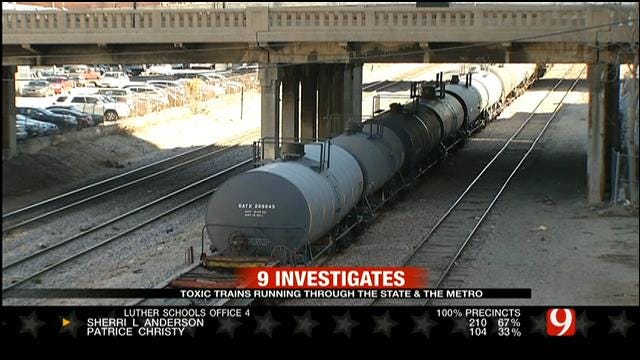Recent Derailments, Deadly Explosions Have Crude Oil Rail Transport Under Scrutiny
They're a moving threat, crisscrossing the metro every hour of every day, and there's a warning tonight about the explosive potential of rail cars traveling through Oklahoma.Tuesday, February 11th 2014, 11:20 pm
They're a moving threat, crisscrossing the metro every hour of every day, and there's a warning tonight about the explosive potential of rail cars traveling through Oklahoma.
Recent derailments and deadly explosions have put rail transport of crude oil under scrutiny.
Along the Canadian border, a train carrying oil from North Dakota and Montana's booming oil patch derailed last July causing explosions that killed 47 people.
Now the feds have issued a warning about that specific type of oil, advising it's more flammable than traditional oil.
As the feds scramble to increase regulations on the transportation of crude oil by rail, trying to make it safer, our investigation reveals those volatile tankers are constantly moving through our state and through Oklahoma City.
In 2005, a train running the tracks in Jones derailed, sending a dozen cars into the fields nearby, prompting a hazmat crew to clean up spilled chemicals.
The owner of the Jones lumber store doesn't even remember it. He said trains are just a part of life here.
"You just get used to them," Mike Evans said.
In 2008, a train derailed just two miles from the center of Luther and exploded. Nearby residents were evacuated but no one was injured. At the time, we knew the tankers that caught fire were full of oil, but our research confirms they were actually full of crude oil from the booming oil patch in North Dakota and Montana called the Bakken shale.
It's the same oil the feds are now warning us about.
Read ODOT's Warning About Bakken Oil
In the warning, the U.S. Department of Transportation sites the more recent and deadly train explosions in Canada and North Dakota, concluding that the millions of barrels of crude oil being shipped out of the Bakken oil fields each day could be more flammable than traditional oil.
Burlington Northern Santa Fe's trains haul most of the Bakken oil to refineries around the country. But BNSF won't say exactly where the trains run, citing homeland security laws following 9-11.
A spokesman for the rail company said, "BNSF shares information about the hazardous materials moving through a community with local emergency responders... but does not make that information public for security reasons."
Hazmat firefighters, many times, are the first to respond to train incidents. Tulsa Hazmat Coordinator, Paul Ator, said actually the railroads only tell them what's in their tankers after there's been an incident, like a leak or a derailment.
"There's really not that much communication as to what's coming in and out of town," Ator said.
View Map Of Railroads In Oklahoma
Combing through newsletters and annual reports of oil and gas and railroad companies reveals tankers carrying the volatile crude are bringing millions of barrels through Oklahoma City to refineries along the gulf.
Ator points to a long line of tankers parked in BNSF's Cherokee rail yard in West Tulsa. "You can see all the ones up here that we're passing now are all low pressure cars," Ator said.
He said until they're told otherwise, Hazmat crews will treat all crude oil the same, which, if it spills calls for an evacuation of at least 1,000 feet. If it's on fire it calls for evacuations of at least half a mile in all directions.
"That's going to be hexane and that's going to be flammable," Ator said while pointing to a placard on the side of one of the tankers.
Ator said he worries more about other chemicals riding our rails.
"It could be oil. It could be diesel, gasoline, propane, anhydrous ammonia, carbon dioxide... just all kinds of stuff in these things," Ator said.
He said Hazmat teams are trained and ready to respond to rail spills, derailments, fires and explosions, and Oklahoma has seen its share. More than 60 incidents involving the release of hazardous materials from trains in our state were reported to the feds in the last ten years, 25 of them labeled "serious."
Mike Evans said he knows trains are carrying hazardous materials through his town but doesn't give it much thought. He hopes he never will.
"It'd affect everybody in town, I'm sure... have to leave town I guess," Evans said.
Among the reforms, the feds are considering in their efforts to make crude transportation safer: phasing out the most common type of tank car that carries hazardous materials on trains; the D-O-T 111 which basically, they say, is no longer safe and can be found in all of our rail yards.
The feds are also considering re-routing hazardous shipments to avoid urban areas, though many say that's just not realistic.
More Like This
February 11th, 2014
March 22nd, 2024
March 14th, 2024
February 9th, 2024
Top Headlines
April 24th, 2024
April 24th, 2024
April 24th, 2024











